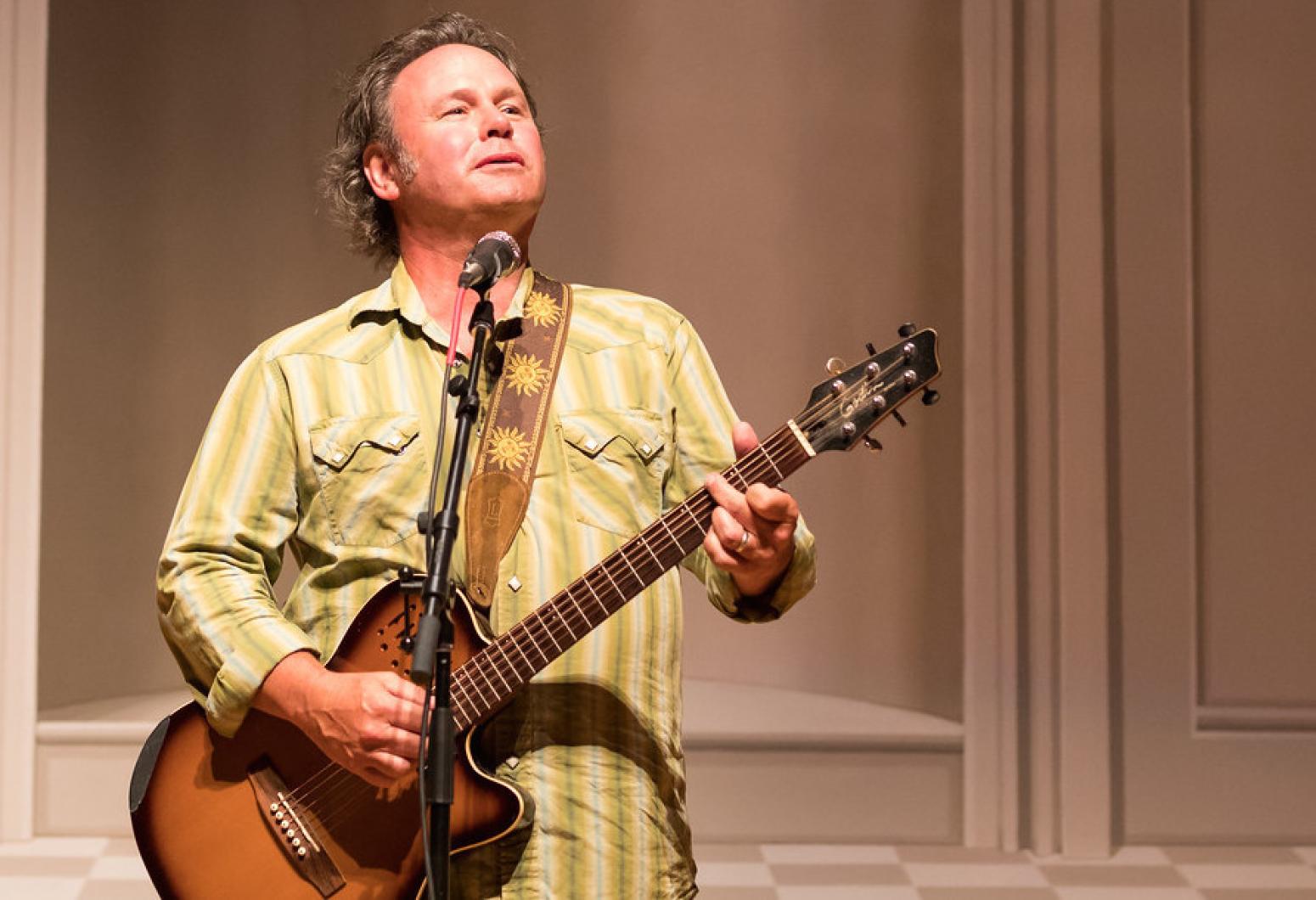Martin Sexton is a showman and on Friday evening he put on a heartfelt show at the Old Whaling Church. It has been nearly 30 years since he moved to Boston from Syracuse to busk on the streets of Harvard Square. At the performance you could still see and hear the street musician in him as well as feel his joy radiating out over the near capacity crowd. The show was a benefit for WMVY and Club Passim in Cambridge.
Mr. Sexton opened with a version of America the Beautiful and then moved into Happy from his 2007 album, Seeds. For the latter he prompted, and easily received, a sung response from his audience. Getting the crowd to sing along is a time-honored folk music tradition. Part of Mr. Sexton’s genius is his melding of folk, show business and pop music traditions. During his next two numbers he transformed himself into a more animated Leon Redbone, imitated a muted trumpet, produced beat box noises by slapping his guitar, and ended one of his own songs with a medley of phrases from U2, Who and Beatles songs.
Between songs, Mr. Sexton addressed the audience with apparently extemporaneous stories and ostensibly free associated comments. One gets the feeling that all of this talk is true, but in the end he does not reveal that much about himself. Mr. Sexton is a singer-songwriter, but he is not really a confessional one.

For most of the show he played a hybrid electrified acoustic guitar, but midway he picked up his old acoustic and the mood of the music shifted from a blue-eyed soul, rhythm and blues mélange to a more folk-based sound. He dedicated Virginia to his mother—who still lives in Syracuse—and led off The Way I Am with a recollection of his street-playing days. His multi-octave range emerged into full flower during yodeled interludes. Mr. Sexton often steps well away from the microphone and projects his voice out into the room under his own power. He times perfectly his return to the mic for the more intimate passages; this choreography appears unself-conscious, but must have been honed over years of practice.
He began My Faith is Gone with a recollection of successfully suing the City of Cambridge in the early 1990s to get them to allow musicians to sing on the streets, and he ended his set with Black Sheep, his breakthrough album from that period. For his encore he brought out a tenor banjo once owned by his grandfather, a City of Syracuse sign painter who wanted to be a Vaudeville performer, and dedicated a medley of This Little Light of Mine and Amazing Grace to the ghost of Pete Seeger.
Watching Mr. Sexton play the banjo in the clawhammer style, you realize that he plays the guitar in much the same way, using his thumb to produce a droning bass and plucking a mixture of rhythm and melody with his curved fingers. With this self-taught style and his extraordinary voice he is able to be a human jukebox, invoking and evoking influences from Cab Calloway to U2 by way of the Red Hots and Lou Reed. It’s no wonder his audience loves him; the possibilities are endless.
Local singer-songwriter Isaac Taylor had the unenviable task of opening for Mr. Sexton. Mr. Taylor’s looks and voice recall his uncle James Taylor, but his songwriting style and his relationship with his influences is entirely different. The Taylor melancholy is intact, but this Millennial version presents it unalloyed with Great American Songbook uplift, and instead its roots go straight into the blues and Appalachian music. From his own Don’t Paint Me Blue to a cover of Bob Dylan’s Death of Emmett Till, Mr. Taylor took his audience on a finger-picked tour of that ancient landscape of hope and uncertainty that is the blues.
Mr. Taylor’s voice is strong and like Mr. Sexton he steps back from the microphone to effortlessly fill the room. But whereas Mr. Sexton is unfailingly buoyant, Mr. Taylor is gorgeously mournful. He will perform again with his aunt Kate Taylor at the Aquinnah Town Hall on August 14 and 15.





Comments
Comment policy »